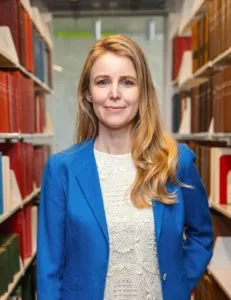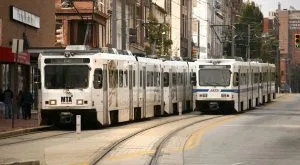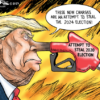Harry Fitzgerald didn’t want to take the community service, but what choice did he have?
With his criminal record, he worried things might get worse if he challenged his open container citation — even though he maintained that he hadn’t committed the crime.
Tall and slim, with deep-set, serious eyes, Fitzgerald stood up in Hargrove District Court in Baltimore Tuesday and took the deal: five hours of community service in exchange for having his case dismissed.
“Think of it this way,” the judge said, trying to ease the sting. “Community service is always a good thing to do, no matter what. You’re helping the community.”
This is the citation docket’s first week back in Baltimore. Low-level quality-of-life offenses are once again churning through the city’s district courts.
On three mornings this week, judges heard the first set of citation cases since Baltimore State’s Attorney Ivan Bates announced that he would resume prosecuting them last month.
It was a response, Bates said, to the community’s calls for accountability after his predecessor, Marilyn Mosby, stopped prosecuting low-level offenses in an effort to reduce the jail population during the COVID-19 pandemic.
In one sense, the non-prosecution policy worked. Mosby extended it in 2021 after a Johns Hopkins study found that people whose charges were dropped rarely committed more serious crimes. But business owners and some residents complained that the lack of prosecutions led to an atmosphere of lawlessness in the city.
Bates pledged to rescind the policy when he ran against Mosby last year, a race that he won by a wide margin. By June 1, he fulfilled that promise, introducing a citation docket that would offer defendants a trade: complete five hours of community service within a month, and your case will be dropped.
“People don’t want people to go to jail for this,” Bates told The Daily Record in court on Monday. They just want the behaviors — trespassing, public drinking, minor thefts — to stop.
The citation docket is also aimed at connecting defendants with “wrap-around services,” such as drug treatment or housing resources. The goal, Bates has said, is not a return to mass incarceration, but offering both accountability and help.
In many ways, though, the citation docket brought the same pressures defendants face in any criminal proceeding.
At hearings on Tuesday and Wednesday, The Daily Record spoke with six people who said their citations had been in error or were based on a misunderstanding by police. Four of them, including 64-year-old Fitzgerald, said they agreed to the community service because they were concerned about worse consequences if they fought the charge or just wanted to get their time in court over with.

One man, 30-year-old Keon Samuel, said he had been wrongly accused of selling water without a license downtown. He handed a bottle of water to another man, who offered him a dollar, when a police officer arrived and issued the citation, he said.
Samuel turned down the offer of community service and asked to take his case to trial. After court, he was critical of the new citation policy.
“It’s harassment covered up by a Black man screaming change,” Samuel said of Bates. “Putting law-abiding citizens in danger with police interactions over water.”
Not everyone felt that way. One man, who stood waiting for the bus after court on Tuesday, acknowledged he took a sip from an open container of alcohol at Lexingon Market when he was cited. He felt five hours of community service was fair.
“It could have been worse,” he said.
The new program highlights the contrast between two clashing philosophies: one that endorses using the criminal justice system to handle quality-of-life issues, and another that believes using the courts to manage low-level offenses causes serious harms and doesn’t address the systemic inequalities at the heart of the problem.
The Maryland Office of the Public Defender is not participating in the citation program because of this disagreement, though it will still represent defendants who qualify.
“We are not participating because we believe it’s a misguided approach,” said Alycia Capozello, the deputy district public defender for Baltimore City.
“…We believe it will lead to harassing, potentially dangerous encounters between citizens and police for very low-level offenses.”
Others see it differently.
Baltimore defense lawyer Andy Alperstein said he believes the citation program will benefit some of his clients by interrupting harmful behaviors like drug use. Drug possession is one of the charges that can be handled with a citation rather than formal criminal charges under the program.
“When we weren’t prosecuting, we weren’t getting them services,” Alperstein said. “This allows for that type of correction without necessarily jailing.”
The citation docket strikes a balance, he said, between incarcerating people for low-level crimes and refusing to prosecute those crimes at all.
“I think we’ve seen two extremes in recent times,” Alperstein said. “We saw the ‘arrest everybody’ policies that history has not judged well, and on the other extreme we saw Mosby’s policy of ‘we’re not going to enforce the laws that are on the books.’ When you have laws that are on the books that aren’t enforced it sends a message to those that make bad choices that there won’t be any accountability or consequences.”
The citation docket is still getting up and running. Many of the citations handled this week were issued before the new policy launched and had to do with business licensing or illegal cigarette sales, which Bates said had been folded into the citation docket even though they do not involve the charges included under his new prosecution policy.
Many other defendants didn’t show and had their cases rescheduled for the next citation docket in August. At most, only about a dozen defendants appeared in court each day, and an even smaller number agreed to the community service deal.
“We didn’t expect to hit a home run right away,” Bates said after sitting in at the Eastside District Court Monday. “I always said it would take time to build.”
Bates said the Baltimore Police Department has faced turmoil in the weeks since the citation policy launched, which could have contributed to a slow start. (Commissioner Michael Harrison, who led the department since 2019, abruptly stepped down last month, and his replacement, Acting Commissioner Richard Worley, faced tough questions from City Council after a mass shooting in Brooklyn left two dead and 28 wounded on July 2.)
Bates criticized the Office of the Public Defender for not participating in the program, a decision that he said “does a disservice to the citizens.”
Through a spokesman, the State’s Attorney’s Office said Wednesday that defendants who believe they were cited in error can contest the charge in court.
“This also highlights how essential the participation of the Office of the Public Defender is for defendants in this process,” said James Bentley, the chief of communications for the State’s Attorney’s Office. “The critical service they provide eliminates much of the fear and doubt for defendants because they can explain the process and possible outcomes and, if needed, provide quality legal representation.”
It wasn’t clear Wednesday whether anyone accepted the offer of wrap-around services this week.
A staff member from the State’s Attorney’s Office spoke to defendants at a rapid clip as they checked in each day: you’re being offered five hours of community service in exchange for a nolle pros (meaning the charges are dropped). Do you need services?

Otherwise, there was very little discussion of services. Defendants were not offered resources when they went before the judge or before they left court.
Across three days, nearly every defendant who appeared in court was a person of color, and most were Black. By coming to court, they also faced the possibility of even more involvement with the legal system.
A bailiff in one courtroom threatened to arrest anyone who “argued” over the no-cellphone policy. A man who came in to handle citations for drug possession and disorderly conduct was swiftly picked up on an outstanding warrant in an assault case and arrested.
Critics of the policy say that interactions with the police and the courts are often harmful for vulnerable people. Police interventions can sometimes turn dangerous or deadly, and court dates require defendants to take time off work, find child care and figure out transportation using already limited resources.
Heather Warnken, the executive director of the University of Baltimore School of Law’s Center for Criminal Justice Reform, called the phenomenon “net widening.”
“Even though the theory may be, in the way that Bates is laying this out, not to punish and take a more services-oriented approach, they are also by design making it easier and more frequent to come in contact with police and the system,” Warnken said.
“The ways in which that’s going to pull more people into the criminal justice system is undoubtedly there.”
The program has eligibility requirements that mean some people won’t be able to benefit from the offer of community service, she noted. To qualify, defendants must have no pending charges or be under supervision for a crime of violence or a handgun offense, and must have no outstanding warrants.
The program also escalates consequences when people are cited more than once. A second citation will bring an offer of more community services hours and another chance to receive services; a third will result in regular prosecution.
Warnken said prosecution distracts from community-based efforts to support people experiencing poverty, mental illness and substance use issues, which often lead to these quality-of-life violations.
“There’s so much hiding in plain sight about what we need to do to invest in communities and change the conditions that are such a big driver of these low-level offenses,” she said.
“That’s not to say I don’t believe in accountability. I think the way that this is being portrayed is completely hiding the ball from those deeper realities.”
Opponents are also concerned that Baltimore’s Black residents will be disproportionately targeted for citations.
An example appeared this week: Fitzgerald, who is Black, said he was cited for an open container on Eutaw Street near Lexington Market. A number of cases this week involved Black residents who were taking public transportation when they were stopped and cited by Maryland Transit Administration Police.
On Tuesday, the same day Fitzgerald appeared in court, a reporter saw white baseball fans openly drinking beers on Baltimore’s light rail, which passes Lexington Market on the way to Camden Yards. There were no police in sight.
g


